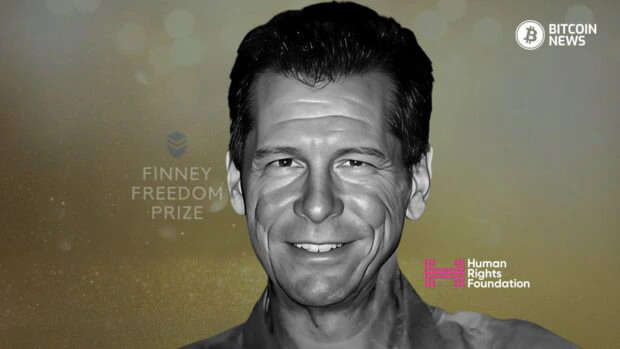On the occasion of the fourth Bitcoin halving, the Human Rights Foundation (HRF) has unveiled a groundbreaking initiative: the Finney Freedom Prize. This prestigious award aims to recognize individuals and organizations that make significant contributions to Bitcoin and human rights. Named after Hal Finney, an early advocate of Bitcoin, the prize celebrates his vision of using technology for liberation.
Honoring Hal Finney’s Legacy
Hal Finney, a renowned civil liberties advocate and electronic cash pioneer, played a pivotal role in the early development of Bitcoin. Recognizing his historic contributions during Bitcoin’s first halving era from 2009 to 2012, the inaugural Finney Freedom Prize has been posthumously awarded to him. Fran Finney, Hal’s widow, expressed gratitude for the recognition, stating:
“We believe this prize will ensure Hal’s legacy endures, inspiring future generations to explore and expand the use of Bitcoin as a tool for achieving personal and collective freedom.”
Objective of the Prize
The Finney Freedom Prize aims to inspire individuals to utilize Bitcoin for advancing human rights and economic liberation globally. Alex Gladstein, HRF’s Chief Strategy Officer, emphasized the significance of the prize in promoting Bitcoin’s potential for empowering individuals. He stated:
“We wanted to help inspire people to use Bitcoin to advance human rights — to help more people achieve economic liberation around the world — and we thought that creating a prize that could be persistent throughout the early lifecycle of Bitcoin would be one way to do it.”
He expressed admiration for Hal Finney’s contributions to Bitcoin, emphasizing his dedication to coding and how he continued to contribute until his final days. He highlighted the significance of the halving event and announced the establishment of the Finney Freedom Prize in honor of Hal Finney, aimed at promoting digital privacy and freedom. Gladstein drew parallels between the Finney Freedom Prize and the Nobel Prizes, hoping it would inspire future generations in the realm of Bitcoin.
Selection Process and Criteria
The selection process for the Finney Freedom Prize involves a meticulous evaluation by the Genesis Committee, comprising notable figures from the Bitcoin community, including:
- Farida Nabourema: Founder of Africa Bitcoin Conference
- Lisa Neigut: Co-founder of Base58 — lead organizer at bitcoin++
- Obi Nwosu: Founder and CEO at Fedi — board member at Btrust
- Ross Stevens: Founder and CEO at Stone Ridge Asset Management
- Aaron van Wirdum: Cypherpunk historian — author of “The Genesis Book”
- Vitus Zeller: Co-founder of Running Bitcoin
- Gloria Zhao: Bitcoin core developer
The committee evaluates candidates based on various criteria. These include educating large audiences about Bitcoin, demonstrating financial freedom through Bitcoin, contributing to Bitcoin’s codebase, promoting decentralization, and enhancing accessibility, especially in authoritarian regimes.
Hal Finney and Bitcoin
Some speculate that Hal Finney could be Satoshi Nakamoto or part of a collaborative effort. However, Bitcoin pioneer Jameson Lopp argues otherwise. His analysis suggests Finney’s absence during Satoshi’s online presence is a hard evidence against that claim. Moreover, Finney explicitly refuted claims of being Satoshi Nakamoto.
During a period when the U.S. government aimed to restrict public access to robust encryption, Hal Finney corresponded with a community of cryptographers. He wrote:
“The work we are doing here, broadly speaking, is dedicated to this goal of making Big Brother obsolete.”
Finney was an advocate of cryptography and open-source coding. In a blog post on Less Wrong in 2009, Finney penned, “my dream is to contribute to open source software projects even from within an immobile body.”
Prize Structure and Sustainability
The Finney Freedom Prize will be awarded every four years on subsequent Bitcoin halving days, totaling 28 awards over the next 110 years. Each laureate will receive a monetary prize of 1 Bitcoin (BTC) and a physical award. The initiative is supported by a 32 BTC fund established by HRF to ensure the prize’s sustainability. Additionally, Fran Finney has directed Hal’s prize to be donated to charity, furthering his commitment to humanitarian causes.
She said:
“Hal would have been thrilled to see how this Bitcoin ecosystem has grown, and to learn that this once-obscure software project is now used by tens of millions of people worldwide […] He would be honored to be the first recipient of this award, and humbled to have it be in his name. I feel great privilege and responsibility in accepting the first prize on his behalf.”
Impact and Future Outlook
The establishment of the Finney Freedom Prize marks a significant milestone in the intersection of Bitcoin and human rights advocacy. By recognizing individuals and organizations that champion these principles, the prize aims to inspire a new generation of activists and innovators. As Gladstein aptly describes it, “We want people to be inspired to be like Hal — to think about more than themselves and about expanding this tool so that it can be accessible to more people.”
In commemorating the legacy of Hal Finney, the Finney Freedom Prize embodies the spirit of innovation and activism at the heart of the Bitcoin movement. With its long-term commitment to honoring those who advance Bitcoin and human rights, the prize sets a precedent for future generations to continue the pursuit of freedom and empowerment through technology.










